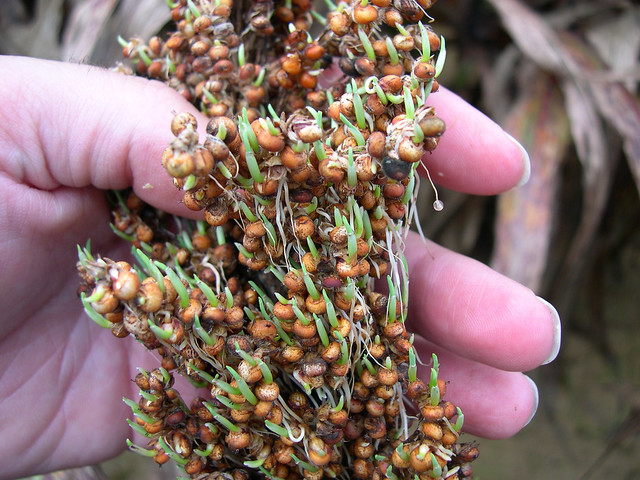Explainer: Grain sprouting
By the U of A System Division of Agriculture
(210 words)
LITTLE ROCK – High humidity can cause many problems with ready-to-harvest crops including sprouting. Jason Kelley, extension wheat and feed grains agronomist for the University of Arkansas System Division of Agriculture, explains:
“For sprouting to develop we need three things to occur, warm temperatures, prolonged periods of wetness, and have grain that is fully mature and close to a harvestable moisture,” he said.

“We are likely looking at two out of the three criteria being met, and the question will be how mature the crop is,” Kelley said. “Grain that was not quite mature or high enough in moisture before rains started will be less prone to sprouting.”
Sprouted grain sorghum is heavily discounted by grain terminals or is not marketable.
“Corn may not be as impacted as grain sorghum, but we can still see sprouting of grain in the ear and development of ear molds, all of which impact grain quality and ultimately the price producers receive for their grain,” Kelley said. “A tight shuck cover on the ear can help shed water and protect grain quality.”
Sprouting can also occur in rice and cotton.
To learn more about crop production in Arkansas, contact your county extension office or visit www.uaex.uada.edu.
Pursuant to 7 CFR § 15.3, the University of Arkansas System Division of Agriculture offers all its Extension and Research programs and services (including employment) without regard to race, color, sex, national origin, religion, age, disability, marital or veteran status, genetic information, sexual preference, pregnancy or any other legally protected status, and is an equal opportunity institution.
# # #
Media Contact: Mary Hightower
Dir. of Communication Services
U of A Division of Agriculture
Cooperative Extension Service
(501) 671-2126
mhightower@uada.edu
Related Links